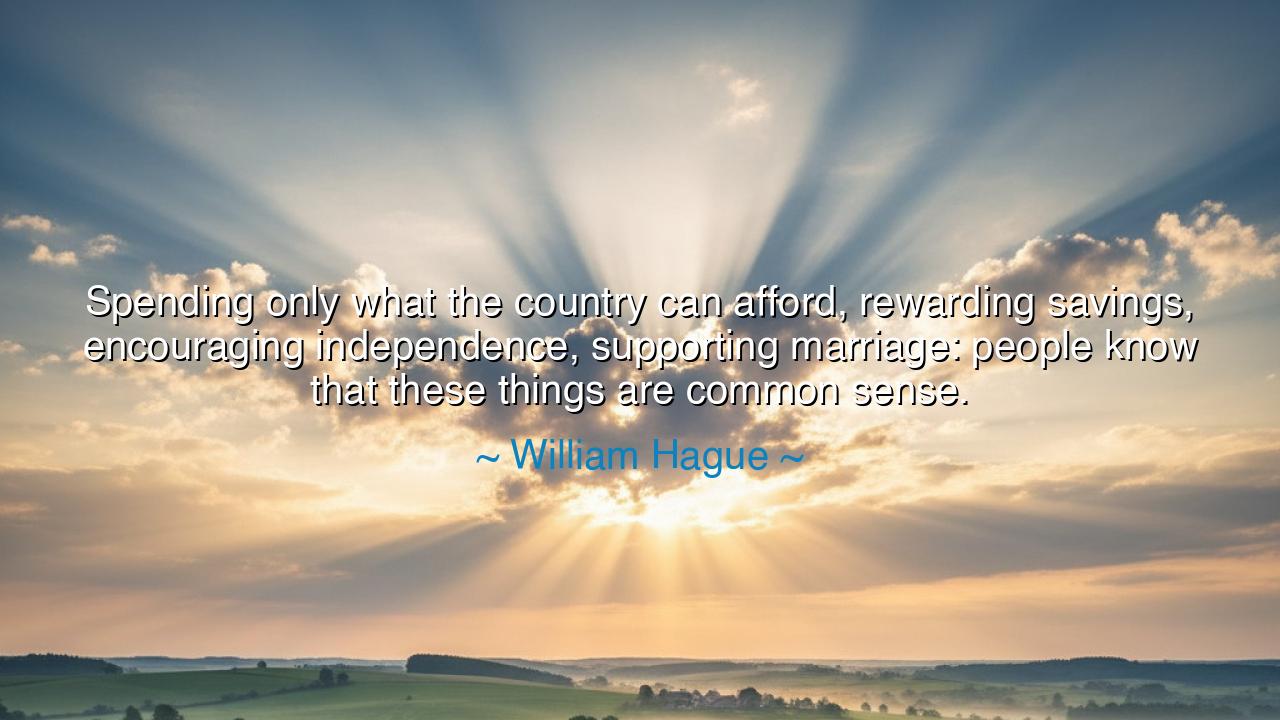
Spending only what the country can afford, rewarding savings
Spending only what the country can afford, rewarding savings, encouraging independence, supporting marriage: people know that these things are common sense.






There are seasons in the life of a nation when wisdom must return to simplicity — when the voice of reason must rise above the clamor of ambition and excess. In one such spirit, William Hague declared, “Spending only what the country can afford, rewarding savings, encouraging independence, supporting marriage: people know that these things are common sense.” Beneath these practical words lies an ancient principle, as old as civilization itself: that prosperity, whether of a nation or of a soul, cannot be built upon recklessness, dependence, or neglect of virtue. Hague spoke not as a merchant of policy, but as a steward of balance — calling his people back to the moral economy that sustains the strength of nations.
The origin of this wisdom reaches far beyond the halls of Parliament or the ledgers of government. It is the same lesson that farmers once learned from the earth, that families learned from hunger and harvest: one must spend only what one can afford. In times of abundance, sow; in times of scarcity, endure. A nation that lives beyond its means is like a man who builds his house on shifting sand — proud for a season, ruined in the storm. Hague’s appeal was, at its heart, a defense of prudence — a virtue often forgotten in the modern age of credit and comfort. For prudence is not miserliness; it is foresight, discipline, and reverence for the future. It teaches that wealth, like freedom, is preserved only by restraint.
When he spoke of rewarding savings, Hague touched upon another sacred truth — that wealth, rightly earned and wisely kept, becomes the seed of stability. In the days of old, the saving man was the pillar of his community. His fields were fruitful because he tended them with patience; his children flourished because he planned for their needs before they arose. So too with nations: when governments honor thrift, they teach their people to prepare rather than to plead, to build rather than to borrow. For savings are not hoarded coins; they are the stored faith of the future, the promise that one’s labor shall not vanish like mist.
Yet Hague’s wisdom does not stop with material things. He speaks also of encouraging independence — that rare virtue by which men and women take responsibility for their own lives. Independence is not the denial of compassion, but the strengthening of character. It is the recognition that dignity is born not from what one receives, but from what one earns. In every age, those who build strong nations are those who refuse to live as dependents upon the labor of others. A free people must not wait for the state to feed them, but must learn to feed themselves; they must see self-reliance not as isolation, but as empowerment — the power to rise, to serve, and to give back.
And then, in his final phrase, Hague invokes the heart of community — supporting marriage. For marriage, in its truest form, is not a contract of convenience, but a covenant of stability. It is where the lessons of prudence, saving, and independence are learned first — around the hearth, in the quiet discipline of shared life. Societies that honor family, that cherish unity between man and woman, between parent and child, build foundations stronger than any law or treasury. The ancients knew this truth: that when families weaken, nations decay, for the strength of the state is but the sum of its homes.
History gives us proof enough of these principles. Consider the fall of Ancient Rome, once the master of the known world. Her riches grew vast, her people idle, her debts mountainous. The Roman citizen, once proud to serve and save, became dependent on the grain dole and the pleasures of the arena. Virtue gave way to indulgence, discipline to decadence, and the empire, bloated with excess, collapsed under the weight of its own abundance. What Hague called “common sense” was what the Romans forgot — that order, thrift, and family are not luxuries, but the lifeblood of civilization.
So, my child, hear this counsel as more than policy — hear it as a philosophy of life. Spend only what you can afford, for debt is a quiet chain that grows heavier with time. Save, not merely money, but wisdom, kindness, and strength, so that when the storms come, you may give shelter to others. Cultivate independence, not in pride, but in purpose — that you may stand upright even when the world trembles. And above all, honor the bonds of love and loyalty, for from them spring all other virtues. These are not grand mysteries but simple truths, the kind that generations have called “common sense,” though they are as rare as gold. Practice them faithfully, and you will live not only wisely, but well — and through you, your nation too shall endure.






AAdministratorAdministrator
Welcome, honored guests. Please leave a comment, we will respond soon